Monthly Archives: June 2016
9 Facts You Need to Know About Mandatory Cargo Weighing Law 
4-minute read
As advised earlier and as constantly reported in industry press the new Mandatory Cargo Weighing Laws has become effective around the globe.
This law is referred to as V.G.M. or Verified Gross Mass, when a ship will not load a container anywhere in the world without a declared VGM.
Dispute Over Import Freight Charges (And What to Do With It) 
2-minute read
The freight forwarding charges debate here in New Zealand, as discussed in the past , has probably come to a head with the statement by the Commerce Commission that “it is not the commission’s role to enforce “Incoterms ” in contracts between forwarders and importers.”
Importers: Alert to New and Used Parts from USA 
2-minute read
Importers were warned this week by the Ministry of Primary Industries to a situation that has arisen for one of the importers, the outcome of which may need to be considered by others.
How to Avoid Paying Duty and GST on Imported Gifts 
3-minute read
The reference 75 concession allows entry of presents or gifts except tobacco products sent from abroad to a resident in New Zealand:
(i) Not exceeding $110 in total value – Free
(ii) Exceeding $110 in total value, on the excess over $110 – The rates of duty applicable to the goods as set out in Part I of the Tariff. (see examples below)
Your Import Shipping Container Could be Full of Toxic Gas 
2-minute read
The researchers’ investigations found 20% of the containers sampled had gas concentrations above safe levels. In the worst case, methyl bromide was found in one container at a level of 50,000 parts per billion — 100 times more than the safe level.
5 Key Principles When Labeling and Packaging Your Goods 
3-minute read
In the past, the major consideration for exporters has been the legislative requirements surrounding the disposal of packaging waste. Driven by the European Union (EU), member countries have developed stringent legislation governing the disposal of packaging waste.
Are You Paying Too Much For Import Freight Services? 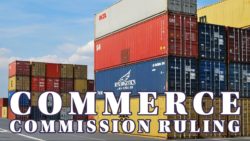
3-minute read
False import charges have become an endemic issue in the local freight forwarding industry with only a limited number of operators excluded from the practice, according to a stakeholder who approached the Shipping Gazette™ following last week’s article on the issue.
Compulsory Container Weighing Rules (Are You Ready?) 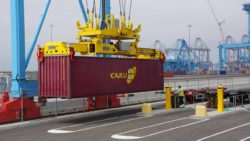
3-minute read
Did you know that the IMO (International Maritime Organization) passed an amendment to SOLAS (Safety of Life at Sea) requiring verification of container weights?
How to Reduce Your Import Charges (One Simple Step!) 
2-minute read
The message is loud and clear from the buyer (importer) to request all applicable destination charges from the China supplier upfront.
New Rules in Trans-Tasman Trade (What You Need to Know) 
2-minute read
A trans-Tasman customs mutual recognition agreement (MRA.) due to come into force by June next year will lessen border checks and speed the movement of export products to market for members of the two countries supply chain security programmes.
Reasons for Delay in MPI Bio-Security Applications 
2-minute read
The Ministry for Primary Industries (MPI) has advised us of seasonally high volumes in bio-security applications.
You Won’t Believe How Much Cash NZ Customs Dogs Find Per Year 
2-minute read
A recent recruit to our Detector Dogs team, Kane, a black Labrador, has been proving his worth at the border.
How to Avoid Buying Fake Goods – and What will Happen to It 
3-minute read
Fake goods are easily accessible everywhere these days – international travel and online shopping make it easy for people to buy counterfeits and import them. You can be almost certain that Prada in a plastic bag at a night market is unlikely to be the real thing.
Can You Reduce Value of The Goods and Minimise Import Taxes? 
3-minute read
If you import goods into New Zealand you must declare the Customs value of the goods on the import entry or clearance document, but questions are always asked – how is the value determined, and what is the process for appeal?
Importer: New Rule for Hazardous Substances (You have 30 Days) 
3-minute read
Most businesses that make or import hazardous substances have to give some basic contact information to Environmental Protection Authority (EPA).
Are You Responsible for New Cargo Weighing Requirements? 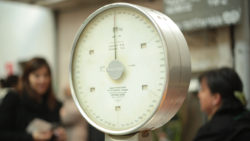
2-minute read
Global Shippers’ Forum (GSF) Secretary-General Chris Welsh was in New Zealand recently, attending the NZ Shippers’ Council annual meeting and also for comprehensive meetings with Government officials.
Why Coastal Shipping is Important for NZ Shippers 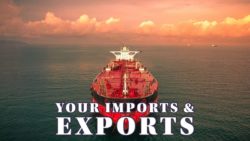
2-minute read
New Zealand’s coastal shipping sector needs to be acknowledged as a valuable transport asset that figures prominently in future transport planning, according to both the New Zealand Shipping Federation and Customs Brokers’ and Freight Forwarders’ Federation (CBAFF).
How to Get a New FernMark – and Receive Instant Credibility 
3-minute read
A new FernMark, embedded with augmented reality and including a global trademark monitoring programme, is now available to help exporters market their products internationally.
Do not Miss Canton Import and Export Fair (3 Practical Tips) 
2-minute read (3-minute watch)
One of the globe’s great trade fairs will commence in Guangzhou province, in southern China, and according to the representative of the China Foreign Trade Centre it will be one of the biggest yet.
Why is Your Shipment Delayed? (How to Avoid Common Issues) 
3-minute read
Many importers and exporters question why does it take so long to go through the New Zealand border? Easy Freight has received the following update from MPI (Ministry for Primary Industries). Unfortunately, it happens several times a year and it is not an isolated case. Therefore, we recommend that you send documents to your Customs broker at least 2-3 weeks before it arrives in New Zealand.
How does Trans Pacific Partnership (TPP) Affect You and NZ 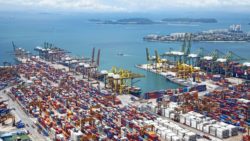
2-minute read
Negotiations for the Trans Pacific Partnership (TPP) Agreement have been successfully concluded. It involves 12 Asia-Pacific countries, which together account for 36 percent of the world’s economy.
This agreement will deliver significant benefits to New Zealand – it will support more jobs, higher incomes, and provide a better standard of living for New Zealanders.
You’re Paying False Import Charges and Don’t Even Know That 
6-minute read
Recent complaints made by importers against several freight forwarder charges are disturbing. It shows that there is a structural problem in the way importers are doing business, and a lack of clarity as to what ‘rules’ apply.
Should New Zealanders Fund Rail and Road? 
5-minute read
Is it time to radically change our thinking in terms of rail? Should we stop expecting a financial profit from the rail, and start to recognise its more strategic importance in our national transport infrastructure?
5 Aspects of a Perfect Import Business (Number 3 is a Gem!) 
4-minute read
Our job is to cut costs and save time for importers and exporters. We would like to share some of the insider secrets with you.
What Problems to Expect When Exporting to China (And How to Avoid Them) 
3-minute read
“It is highly recommended that all companies do their due diligence before committing to the overseas market”. This was the main message from Mr Paul Smith, NZ Customs Counsellor.
The Do’s and Don’ts When Working with an Overseas Supplier 
4-minute read
Interview with Aaron Muir from Argus Tracking. Aaron Muir is a director of Auckland-based firm Argus Tracking, which has had its asset management hardware manufactured in multiple countries.
2 Shocking Facts You Need to Know About Imported Flowers 
2-minute read
The New Zealand Flower Growers Association (NZFGA) wants imported flowers to be labelled as imports so consumers can make an informed choice about whether to buy them.
How to Import a Car and Avoid Costly Mistakes 
3-minute read
New Zealand has quite an old vehicle fleet compared to many other countries. The average age of a car is about 13 years.
Why Do Shipowners Have a Limit on Compensations? 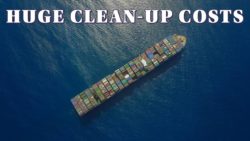
6-minute read
Politics involves a heap of misleading information. The tendency is to seize on populist themes and fashion statements that meet with approval over the dinner table, in smoko rooms and in the pub.
How to Import Building Materials Duty-Free 
2-minute read
Most residential building materials can now be imported into New Zealand duty-free as a result of a new tariff concession scheme recently announced by the Government.
Can You Really Trust Parallel Imported Goods in New Zealand? 
3-minute read
Parallel imported goods are genuine branded products that are imported into New Zealand (or other countries) and sold within that market without the brand’s owner consent.
9 Surprising Facts About the Worldwide Shipping Industry 
3-minute read
How do the goods of the world travel from one place to another? Despite technological advancements and the propagation of a globalized economy, a surprising 90% of everything still comes and goes on a ship by sea.
How to Find an Overseas Supplier for Your Product Idea 
3-minute read
Finding the right supplier for your product idea may prove challenging. If possible, you should find one that you like working with, and they should also provide you with a quality product at a fair price.
Here are the steps involved in finding a supplier, and some of the many considerations you will have to navigate along the way.
What does Asia’s Rise Mean for Your NZ Company? 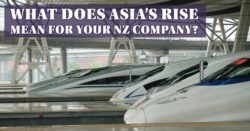
3-minute read
The IMF (International Monetary Fund) data indicate a continued rise in the proportion of the global GDP accounted for by Asia. The Asian region almost doubles in importance in the 40-year period to 2020, rising from 18.3 percent of the global economy in 1980 to 30.8 percent in 2020.
5 Rules That Could Impact Your New Zealand Importing 
3-minute read
There are several rules that could impact your importing, and it is vital to know what procedures you need to follow in order to ensure timely and safe delivery of your goods.
[True Story] Is Your Marine Insurance a Waste of Money? ![[True Story] Is Your Marine Insurance a Waste of Money](https://easyfreight.co.nz/wp-content/uploads/2016/06/True-Story-Is-Your-Marine-Insurance-a-Waste-of-Money_-250x141.jpg)
5-minute read
There are some harsh lessons sometimes handed out in business. A good case was reported in the Shipping Gazette™ of a cargo owner with a shipment on board the ill-fated cargo vessel Rena.
To pay for the freight of a consignment of export goods from Napier port that gets as far as the Bay of Plenty and ends up on the seafloor, seems to incur a triple slap in the face.
Importing Into NZ? Have You Considered These 6 Risks? 
4-minute read
Thinking about importing goods into NZ? Perhaps you can access better prices or superior quality overseas? Or maybe you’ve identified a market for goods that just can’t be sourced locally?
But importing into NZ is more complicated than it may seem at first. The risks are significant if you don’t know what you’re doing. To give your venture the best chance of success, it’s best to learn the risks before you start such business.
BEWARE: NZ Importers Targeted by Email Hacking Scam – 5 Ways to Control It 
2-minute read
A dangerous and highly effective new online scam is affecting New Zealand importers. The scam has already left several Kiwi businesses severely out of pocket, with some businesses losing deposits of over USD 250,000 to scammers.
Cargo Insurance: The Shocking Truth for Importers & Exporters 
4-minute read
As an importer or exporter, you’re no doubt always on the lookout for ways to save your money. But there’s one place you shouldn’t be skimping on, and that’s cargo insurance.
How to Import Household Goods — The Ultimate Guide 
5-minute read 3
Our clients often ask us about the goods that are restricted for importing to New Zealand. Can one bring necessary medicine, favourite DVD collection or some rare artwork as an unaccompanied baggage?
Why is Customs Holding Your Parcel? (and How to Avoid It) 
2-minute read 2 (4-minute watch)
International Postal Regulations require that every item passing an international border is subject to Customs inspection in the destination country.
Importers: Beware of ‘Fake’ Import Charges 
3-minute read
Importers to New Zealand need to beware of a legal ‘loophole’ that leaves you exposed to unexpected and unwarranted charges on your imported goods.
When you buy goods overseas under cost and freight rate (CFR) terms (see our Incoterms page for more about this), this should mean the seller covers the costs of freight to you in New Zealand.
But in some recent cases, importers have been hit with extra charges when their goods arrive, leaving them out of pocket.
25% of Courier Parcels Evade NZ Import Duty 
2-minute read
With the rise of internet shopping more and more New Zealanders are importing goods from overseas using postal and international courier services.
Tips on Importing Goods Into New Zealand 
4-minute read
This information is to help people understand the collection of Customs tariff duties, plus goods and services tax (GST), on articles imported into New Zealand.
It explains how Customs tariff duty is charged on goods imported into New Zealand, lists a number of concessions, and describes which goods are subject to strict import control, or are absolutely prohibited.
Demurrage and Detention: A Complete Comparison 
3-minute read
People often get confused by these two words Demurrage and Detention. Well then, what is the difference? When dealt with in the context of containerised cargo, simply put,
- Demurrage relates to container storage at terminal (charged by the port)
- Detention relates to container usage (charged by the shipping line)
Be Smart, Defer Payment to Customs 
6-minute read
THE MAIN ADVANTAGES TO IMPORTERS ARE:
- Deferral of the payment of Customs charges for up to seven weeks, with a minimum period of three weeks.
- No requirement to pay cash on each import entry. Instead, importers have an account with Customs and settle one month’s transactions with a single payment.
Your Expectations from Us 
2-minute read
Easy Freight has responsibility in making sure your orders not only head to the destination in good condition but actually go through customs border without delay.
How to Get Paid 
4-minute read
Both buyers and sellers need to determine the risk to their own business, the amount they are willing to pay to mitigate that risk. There are four commonly used payment methods for reducing these risks.




































![[True Story] Is Your Marine Insurance a Waste of Money](https://easyfreight.co.nz/wp-content/uploads/2016/06/True-Story-Is-Your-Marine-Insurance-a-Waste-of-Money_-250x141.jpg)











